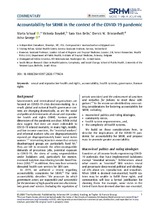| dc.description.abstract | Governments and international organisations are focused on COVID-19 crisis decision-making. As a result, global and national health governance contexts are changing dramatically, as are the social and political determinants of sexual and reproductive health and rights (SRHR). Various gender dimensions of the pandemic are clear. While initial data suggest that men are more vulnerable to COVID-19 related mortality, in many high, middle, and low-income countries, the “essential workers” and informal workers who are disproportionately exposed are disproportionately lower social status women. (Boniol et al., 2019; Wenham et al., 2020) Intersecting injustices mean that certain disadvantaged groups are particularly hard hit. (Morgan & Davies, 2020) They are left to reconcile the often-incompatible demands of precarious jobs, potential exposure to COVID-19, the stress of caring responsibilities under lockdown and, particularly for women, increased isolation exacerbating Gender-Based Violence (GBV). | en_US |

